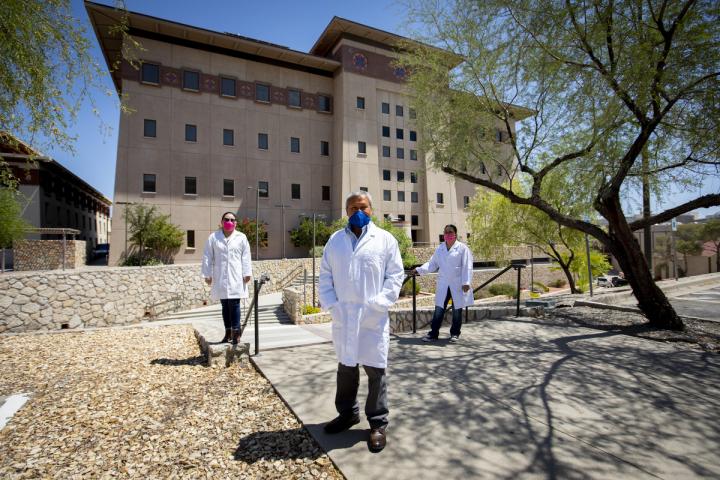
Credit: Ivan Pierre Aguirre / UTEP Communications
EL PASO, Texas – The University of Texas at El Paso was awarded $1.3 million from the National Institutes of Health to shed light on how the combined function of neural circuits impacts specific behaviors in humans.
Leading the research in UTEP’s Department of Biological Sciences is Manuel Miranda-Arango, Ph.D., associate professor of biological sciences. Miranda’s laboratory in UTEP’s Border Biomedical Research Center (BBRC) investigates localization and function of nerve cells containing glycine transporters and the efficacy of communication among them and with other nerve cells in the nervous system.
“I can’t think of a more deserving faculty member for this research award and I am very excited for the studies he has planned to improve, assess and address some fundamentally important questions regarding central brain function,” said Robert A. Kirken, Ph.D., dean of the College of Science. “The result of his work will undoubtedly translate into improved human health care.”
Miranda said the study will seek to identify and characterize glycinergic neurons in the basal ganglia, a brain area that participates in initiation of voluntary movements and cognitive functions such as emotion, vision and some forms of memory.
“To address this question, we will use several genetic, physiological and biochemical approaches combined with traditional histochemical analysis to demonstrate the presence of glycinergic neurons in areas of the basal ganglia,” Miranda said.
The project will investigate the nerve cells of the mammalian nervous system that utilize the gamma aminobutyric acid (GABA) and glycine as inhibitory chemicals to modulate nerve cell activity and consequently many functions of the human body. Although the location and function of neurons containing the chemical GABA is relatively well-studied, the properties of neurons using the chemical glycine as a message remains poorly defined in the central nervous system.
“The results should provide evidence of the precise location of novel inhibitory glycinergic neurons and their connections to other brain areas,” Miranda said. “This work will contribute to a better understanding of the basic basal ganglia architecture and how the combined function of different neural circuits regulate specific behavior.”
The University of Texas at El Paso is one of the largest and most successful Hispanic-serving institutions in the country, with a student body that is over 80% Hispanic. It enrolls more than 25,000 students in 167 bachelor’s, master’s and doctoral programs in 10 colleges and schools. With more than $100 million in total annual research expenditures, UTEP is ranked in the top 5% of research institutions nationally and fifth in Texas for federal research expenditures at public universities.
###
Media Contact
Victor H. Arreola
[email protected]
Original Source
http://www.




